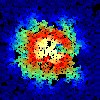Probability Seminar
In first-passage percolation (FPP), one assigns i.i.d. weights to the edges of the cubic lattice Z^d and analyzes the induced weighted
graph metric.
If T(x,y) is the distance between vertices x and y, then a primary question in the model is: what is the order of the fluctuations
of T(0,x)?
It is expected that the variance of T(0,x) grows like the norm of x to a power strictly less than 1, but the best lower bounds
available are (only in two dimensions) of order \log |x|.
This result was found in the '90s and there has not been any improvement since.
In this talk, we discuss the problem of getting stronger fluctuation
bounds: to show that T(0,x) is with high probability not contained in an
interval of size o(\log |x|)^{1/2}, and similar statements for FPP in
thin cylinders.
Such a statement has been proved for special edge-weight
distributions by Pemantle-Peres ('95) and Chatterjee ('17).
In ongoing work with J. Hanson, C. Houdré, and C. Xu, we aim to extend these bounds
to general edge-weight distributions.
I will explain some of the methods we are using, including an old and elementary ``small ball'' probability result for functions on the hypercube.
